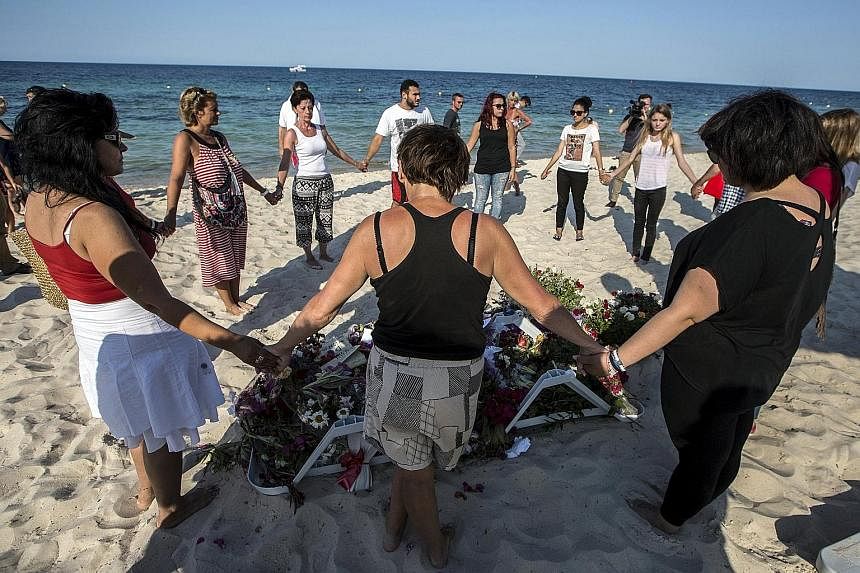CAIRO - Mr Massoud Riahi scratches out a living selling silver necklaces outside Tunisia's National Bardo Museum. His income has plummeted since armed militants attacked the building in March, killing at least 22 people.
Last Friday's massacre at the seaside resort in Sousse will only make things tougher.
A Tunisian student disguised as a tourist pulled out a Kalashnikov assault rifle hidden inside a beach umbrella and opened fire on holidaymakers - 39 were killed and another 38 were wounded, six of whom were still in "serious condition" on Sunday.
Tunisian authorities have arrested a group of suspects associated with the attacker, who was shot dead by a policeman after the massacre. Interior Minister Najem Gharsalli did not give further details yesterday, but said officials were still verifying whether the attacker had been trained in neighbouring Libya in militant camps.
"Tunisia's tourism is living through dark days," Mr Riahi said.
Before the museum attack, Mr Riahi said he made about 100 dinars (S$69) a day selling necklaces. These days, sometimes he comes home with just five dinars.
While Tunisia has evaded the worst of the unrest that swept Libya, Syria and Egypt since 2011, the violence is hurting an economy struggling to recover after the uprising that toppled President Zine El Abidine Ben Ali.
Tourism accounts for about 7 per cent of Tunisia's economic output, according to the International Monetary Fund (IMF), and is one of its biggest foreign-currency earners. About 15 per cent of the workforce is either directly or indirectly employed in tourism, according to the IMF.
The Tunisian government on Sunday moved to boost security, saying it would deploy armed officers "inside and outside hotels", on beaches and at tourist and archaeological sites. Police on horseback and quad bikes patrolled the beach at Port El Kantaoui, north of Sousse. The authorities plan to close 80 mosques accused of inciting extremism.
Said Mr Mohammed Ali Toumi, head of the Tunisian Federation of Travel Agencies: "Hotels may close their doors and hotel owners may go bankrupt. About 700 travel agencies that employ 14,000 people will be affected by this terrorist attack."
Economic growth, which averaged 4.7 per cent in the five years through 2010, slowed to 1.7 per cent in the first three months this year, central bank data showed.
"The terrorists understand the importance of tourism to the Tunisian economy and they acted accordingly," said Mr Moez Joudi, an economist and president of the Tunisian Governance Association.
First-quarter tourist arrivals were already below their 2010 levels, said Ms Razan Nasser, senior Middle East and North Africa economist at HSBC Holdings.
The Islamic State in Iraq and Syria (ISIS) claims to have been behind the attack in Tunisa, along with a same-day suicide bomb attack on a Shi'ite mosque in Kuwait and the inspiration for an attack at a French factory by a man who beheaded his boss.
But it is not clear whether the actions are centrally planned or coordinated by ISIS, according to Mr Yezid Sayigh, a senior associate at the Carnegie Middle East Centre think-tank.
"That said, we may be seeing the start of a long campaign conducted by ISIS members or sympathisers who have been trained and sent back home to their countries to take their own initiative in planning and conducting attacks, depending on their abilities, resources and opportunities," he said.
BLOOMBERG, AGENCE FRANCE-PRESSE, REUTERS

